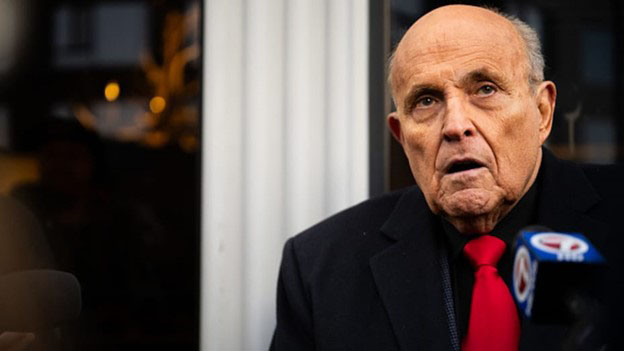(Reuters) – A U.S. judge yesterday ended Rudy Giuliani’s bankruptcy, allowing lawsuits for defamation, sexual harassment and other claims to proceed against Donald Trump’s former lawyer.
U.S. Bankruptcy Judge Sean Lane in White Plains, New York, also banned Giuliani from seeking bankruptcy for one year.
Giuliani, 80, filed for bankruptcy protection in December after a Washington, D.C., court ordered the former New York City mayor to pay $148 million to two Georgia election workers who he falsely accused of rigging votes in the 2020 presidential election which was won by Democrat Joe Biden.
The bankruptcy prevented the former Georgia election workers, Wandrea “Shaye” Moss and her mother Ruby Freeman, from collecting on that judgment, while freezing other lawsuits stemming from Giuliani’s work for Trump, the former Republican president, as he sought to overturn his loss in the 2020 election.
The dismissal allows Giuliani’s creditors to resume lawsuits against him, but it frees Giuliani to appeal the $148 million defamation judgment that forced him to seek bankruptcy protection.
Now that he is no longer in bankruptcy, Giuliani intends to appeal the judgment, his lawyer Heath Berger said on Friday following the ruling.
As detailed by a Reuters investigation, Moss and Freeman’s lives were upended by a barrage of threats after a hearing of Georgia lawmakers in December 2020, where the Trump campaign falsely claimed surveillance video from a ballot-processing room at State Farm Arena in Atlanta amounted to “shocking” evidence of fraud.
Giuliani later showed snippets of the video and repeatedly identified Moss and Freeman by name, calling them “crooks” who “obviously” stole votes.
Rachel Strickland, a lawyer for Moss and Freeman, said her clients would immediately move to enforce their judgment against Giuliani.
“We are pleased the court saw through Mr. Giuliani’s games and put a stop to his abuse of the bankruptcy process,” Strickland said.
In dismissing the bankruptcy case, Lane cited Giuliani’s “continued failure to meet his reporting obligations and provide the financial transparency required of a debtor.”
Giuliani’s personal disclosures were late and incomplete, and Giuliani’s businesses never made financial disclosures in bankruptcy court.
Giuliani’s own bankruptcy lawyers appeared unaware that Giuliani was promoting a coffee brand until his creditors raised concerns about media reports, Lane wrote.
After seven months in Chapter 11, Giuliani had made no progress on a potential bankruptcy settlement with the people who have sued him, Lane wrote. Ending the bankruptcy made more sense than continuing to spend money on bankruptcy fees that would ultimately reduce his ability to pay creditors, Lane said in Friday’s ruling.
Giuliani’s creditors have alleged that he flouted bankruptcy disclosure rules and continued to spend lavishly after filing for Chapter 11.
Giuliani paid salaries to his girlfriend Maria Ryan and her daughter, failed to report income from his businesses, and made defamatory statements that caused the cancellation of his WABC radio show, creditors said.
In addition to Moss and Freeman, Giuliani’s creditors include former employee Noelle Dunphy, who has accused Giuliani of sexual assault and wage theft, and the voting machine companies Dominion and Smartmatic, who have also sued Giuliani for defamation. Giuliani has denied the allegations.
Giuliani separately is facing criminal charges in Georgia and Arizona for allegedly aiding Trump’s efforts to subvert the election. Giuliani has pleaded not guilty and called the allegations politically motivated.
The onetime Manhattan U.S. Attorney was stripped of his New York law license earlier this month when a court found he “baselessly attacked and undermined the integrity of this country’s electoral process” by spreading false election fraud claims.






